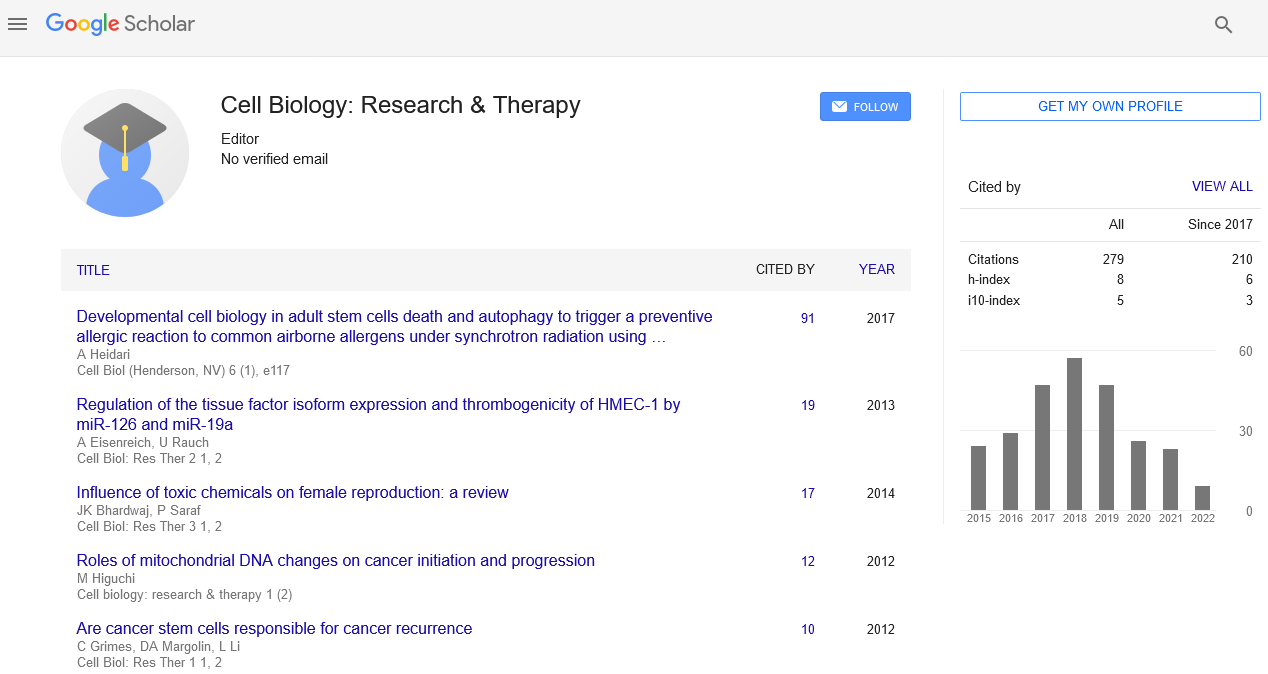Editorial, Cell Biol Res Ther Vol: 1 Issue: 2
Future of Medical Practice and the Key Roll of Cell Biology; Bench to Beside
| Alireza Ziaei* |
| Harvard Medical School, USA |
| Corresponding author : Dr. Alireza Ziaei, M.D Harvard Medical School, USA E-mail: alireza.ziaei@schepens.harvard.edu |
| Received: June 28, 2012 Accepted: July 02, 2012 Published: July 04, 2012 |
| Citation: Ziaei A (2012) Future of Medical Practice and the Key Roll of Cell Biology; Bench to Beside. Cell Biol: Res Ther 1:2 doi:10.4172/2324-9293.1000e106 |
Abstract
Future of Medical Practice and the Key Roll of Cell Biology; Bench to Beside
Cells are the fundamental unit of life and cell biology lies at heart of biomedical research. Cell Biology therefore defines the very center of all efforts to understand all aspects of human disease. All diseases are disturbances at the cellular level. To treat disease, we must understand the alterations that occur at the level of individual cells. The complementary nature of many of the researches generates a highly interactive and collaborative environment that promotes the development of novel approaches to address fundamental biological questions.
| Cells are the fundamental unit of life and cell biology lies at heart of biomedical research. Cell Biology therefore defines the very center of all efforts to understand all aspects of human disease. All diseases are disturbances at the cellular level [1]. To treat disease, we must understand the alterations that occur at the level of individual cells. The complementary nature of many of the researches generates a highly interactive and collaborative environment that promotes the development of novel approaches to address fundamental biological questions. | |
| As the study of cell biology will become increasingly important to the study of disease, the study of the cellular basis of human disease has already produced some fundamental insights into cell biological principles. In recent years, the completion of the sequencing of the human genomes, coupled with the development of new technologies for the analysis of biological processes using genetic, cellular and biochemical approaches, has greatly accelerated these advances, and this pace will surely be accelerated exponentially in the future. Therefore, a major challenge of the next decade will be to translate these advances into identifying the best molecular targets for cancer therapies and diagnostic tests as well as to facilitate the design and testing of novel approaches for anti-cancer treatment. Several recent advances in our understanding of cellular signaling mechanisms have been successfully translated to the development of novel strategies for disease treatment. Recent technical developments, in particular in imaging, have brought a range of new tools to cell biologists that allow cell processes to be analyzed at significantly higher resolution, in terms of both biochemical complexity and spatial and dynamic organization. One aim of cell biologists over the next 10 years will be to use these advances to build a more complete understanding of normal cell organization, dynamics and regulation, how these processes are perturbed under different disease conditions, and what pathways and targets might be best exploited for rational drug design. | |
| Over the last 20 years there has been a gradual shift in the emphasis of basic biomedical research from the study of disease in patients and their organs to its definition at the level of molecules and cells. In the short time during which this field has evolved, enough is known already to suggest that this knowledge will have major implications for the development of more precise diagnostic and therapeutic agents in the future. The World Health Organization has predicted that by the year 2020 there will be a major shift in the pattern of disease. As standards of hygiene, nutrition and social conditions improve, there will be a gradual decline in infant and childhood mortality due to infectious disease. On the other hand, there will be a steady increase in diseases such as heart disease, diabetes and other forms of vascular disease. It is important, therefore, that medical practice prepares itself for the remarkable possibilities that the sciences of molecular and cell biology will offer it in the future. It has only been possible to outline a few of the applications of molecular and cell biology to practical medicine. But enough has been achieved already to make it clear that this field has enormous possibilities for improving the human health. |
 Spanish
Spanish  Chinese
Chinese  Russian
Russian  German
German  French
French  Japanese
Japanese  Portuguese
Portuguese  Hindi
Hindi 